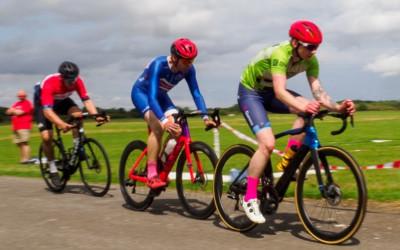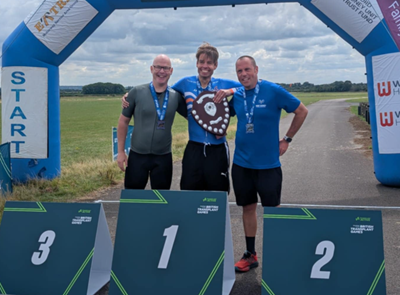OU study: Transplant athletes match elite performance

A new study led by The Open University’s (OU) Professor Bart Rienties, and to be published in Progress in Transplantation in December, reveals that high-intensity transplant athletes can not only meet but greatly exceed existing physical activity guidelines — performing at levels comparable to non-transplant athletes in competitive events.
Drawing on self-reported and objective performance data from 25 cycling and triathlon competitors at the 2023 World Transplant Games in Perth, Australia, the research found participants maintained an average of 8.33 hours of weekly physical activity, more than three times the UK’s recommended 150 minutes per week for transplant recipients. Objective data from GPS-based fitness apps, such as Strava, confirmed that athletes recorded an average of 4.67 hours per week of moderate to vigorous exercise, covering nearly 100 kilometres weekly.
The findings – published in the paper on ORO – challenge current conservative physical activity guidelines for transplant recipients, suggesting that some individuals — with the right support and medical clearance — can safely train and compete at high intensity. In competition, transplant athletes recorded speeds and heart rates comparable to non-transplant cyclists on the same course, demonstrating that peak performance is possible post-transplant.
Bart Rienties, Professor of Learning Analytics at OU explained:
“Most medical literature suggests transplant recipients are less active after surgery, but our data show that with the right preparation and motivation, some can achieve truly exceptional levels of fitness and competitive success. These athletes are living proof of what’s possible, and their stories could inspire changes to physical activity recommendations.”
For Bart, the research is deeply personal. As a transplant recipient himself, he first discovered the World Transplant Games while waiting for treatment at Milton Keynes Hospital. Inspired, he entered the British Transplant Games in 2015, winning bronze in his debut. Since then, he has become a World Champion in cycling at the Games, and earlier this year he won gold at the British Transplant Games once again. He is now preparing to represent the UK at the World Transplant Games in Germany.

His journey into this research was fueled by recognising a gap between medical advice and the real-world capabilities of highly active transplant recipients. “The official guidelines are invaluable for ensuring safety,” Bart said, “but they may unintentionally limit those who are able to push further. By studying elite transplant athletes, we can learn more about safe progression, training strategies, and the positive impacts on health and quality of life.”
The study also found that objectively recorded activity — rather than self-reported exercise — was the strongest predictor of competitive performance, underlining the value of using fitness technology to track and support training. Age was not found to be a barrier, with older transplant athletes performing at comparable speeds to younger competitors.
The research was funded by the Open University’s Open Societal Challenges programme, reflecting the OU’s commitment to impactful research that improves lives. By bridging the gap between academic knowledge, lived experience, and sporting achievement, Professor Rienties and his colleagues are helping to shape a more nuanced and aspirational view of post-transplant potential.
Contact our news team
For all out of hours enquiries, please telephone +44 (0)7901 515891
Contact detailsNews & articles

OU joins NBIC’s national biofilm research network
The Open University is proud to announce its inclusion in the National Biofilms Innovation Centre (NBIC) consortium as part of NBIC’s sixth accession round.